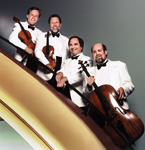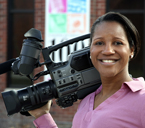Inside Iowa State
Inside ArchivesSubmit newsSend news for Inside to inside@iastate.edu, or call (515) 294-7065. See publication dates, deadlines. About InsideInside Iowa State, a newspaper for faculty and staff, is published by the Office of University Relations. |
May 18, 2006 Hitting a high note in South Africaby Erin Rosacker Six Iowa State faculty members will join Simon Estes, ISU's F. Wendell Miller Distinguished Artist in Residence, on a trek to South Africa May 22-June 6. The Ames Piano Quartet, which includes music faculty members Mahlon Darlington (violin), William David (piano), Jonathan Sturm (violin) and George Work (cello), will travel with collegues and vocalists Mary Creswell (mezzo-soprano) and Donald Simonson (tenor) for a series of three concerts in Cape Town. The group raised its own funds for the trip, including the use of travel grants and support from the ISU Foundation. In addition to the concerts, the group will work with students and teach music classes. One performance venue on the itinerary is the Simon Estes Music School, an institution that provides musically gifted youth from disadvantaged backgrounds the opportunity to study and train in music. Another concert will be held in the Cathedral Church of St. George, the home church of archbishop and Nobel laureate Desmond Tutu. Of mice and squirrelsBrent Danielson, an associate professor in the department of ecology, evolution and organismal biology, will begin a professional development assignment July 1, using mice to research a red tree squirrel species and its importance to the ecosystem in different areas. This endeavor will take him to remote locations in northern Minnesota, west central Wyoming and southeast Arizona. Danielson will travel by himself on his own dime to these areas, including a horseback trip into the mountains of Wyoming, to trap mice for the study. The mice will be ear-tagged, released and recaptured to document the diversity and abundance of small mammals in the locations. Mice are just one group of small mammals that visit the middens, or "grocery stores," that are stocked by red squirrels. The abundance or lack of mice and other species, which rely upon these middens for their food source, should reflect the impact of red squirrels and their middens upon that ecosystem. He hopes to use the data for future research and grant opportunities. "If I am really lucky, I will gain enough insight and preliminary data to justify many returns to some of these places to answer more complex questions that have yet to even dawn on me," Danielson said. Chasing the windMeteorology professor Bill Gallus will have the wind at his back -- and front -- for his summer project. He is part of a team of researchers headed by aerospace engineering professor Partha Sarkar that will be studying wind storms in hopes of applying the data to construction of buildings that better withstand severe weather. Gallus, one of six professors involved in the project, could accompany professional storm chaser Tim Samaras as he tracks tornados. Samaras and a group of students will be following tornadoes in May and June, hoping to compile data of wind speeds at ground level with probes. If those storm paths move near Iowa, Gallus will leave the laboratory and join the crew in the chase. "Wouldn't it be a thrill to be there when they collect the first wind measurements from inside a tornado?" said Gallus. The project, federally funded through the National Oceanic and Atmospheric Administration, will allow Iowa State to upgrade its equipment in the wind laboratory, including the tornado simulator and wind tunnels. Lights, camera, action!Shelley Rouse, a lecturer in the Greenlee School of Journalism and Communication, was awarded an Educator in the Newsroom Fellowship by the Radio and Television News Directors Foundation. After participating in a three-day orientation in Washington, D.C., May 17-20, she will spend the next four weeks working at WHO-TV in Des Moines. The fellowship, one of nearly two dozen funded by the John S. and James L. Knight Foundation, was developed to get educators into the field to experience technological advances and the day-to-day issues of the profession. "To have someone think of us and invest in us is amazing," Rouse said. "I'm really looking forward to getting back into that professional environment." Globe-trottingA University Professor in materials science and engineering, Steve Martin is planning to log massive frequent flier miles this summer, traveling to Asia and Europe. He will be using International Collaboration Grants to fund the trips, during which he'll develop collaborations with colleagues. For example, with peers in Germany, Greece, Italy and France, he'll work on a future joint proposal to the National Science Foundation and collaborate on research in fuel cells and lithium battery technologies. Martin plans to travel to Korea, Japan and China in June to help develop relationships on work related to lithium battery and glass-related topics. No monkey businessJill Pruetz, an assistant professor of anthropology, returns to Senegal, West Africa, this summer to continue her research, funded in part by the National Geographic Society and the National Science Foundation. She and her team are focusing on the study of savanna chimpanzees and the effects of ecology on their behavior. Pruetz has made enough trips to a small village in a remote location that the community of chimps accept her presence. She and her research team are approximately five years ahead of schedule on a project that started in 2000. |
 Ames Piano Quartet members (left to right) Jonathan Sturm, Mahlon Darlington, William David and George Work. Photo provided by the music department.  Shelley Rouse was awarded a fellowship that sends her back into the journalism field this summer. Photo by Matt Neznanski. SummarySome faculty members will be spending their summers away from Ames, working on projects ranging from red squirrels to fuel cells. Quote"I'm really looking forward to getting back into that professional environment." Shelley Rouse, Greenlee School of Journalism and Communication lecturer |